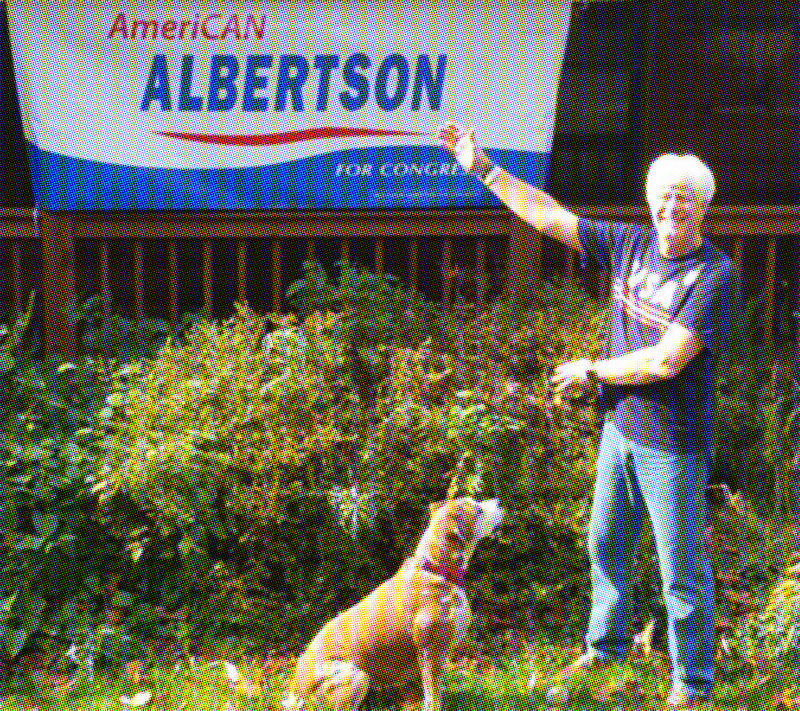Running blue in Ohio’s 12th District requires sacrifice without much hope to sustain you.
The incumbent was Pat Tiberi, an eight-term US House member buoyed comfortably by a gerrymandered, blood-red constituency and $4 million in the coffers. Not to mention he’d been knighted, an honor bestowed in 2013 by the Italian ambassador to the United States.
The challenger, Ed Albertson, a full-time sales-trainer for a small firm in Cincinnati, was asked by the Licking County Ohio Democratic Party to run. Albertson was initially reluctant because of serious responsibilities at home: “Believe me,” says Albertson, “2016 was not the year I would have chosen to do this. My wife, Beth, was diagnosed with cancer last Thanksgiving and we’ve been battling that disease together. She did encourage me to run, however, because she believed we both needed something else in our lives besides cancer.”
Albertson wondered if he could maintain a work-life balance while running for office, but ultimately what tipped the scales was his conviction that “having a Congressional office uncontested goes against the very fundamentals of a democracy.”
At the top of Albertson’s platform was the threat of climate destabilization, a topic starkly absent from the conversations surrounding the Presidential election. This was Albertson’s key issue not only because of its obvious threat to the well-being of the planet, but because of the potential for adding well-paying jobs to a struggling economy. Eco-Industry jobs would be a boon to the 12th district, whose landscape is dotted with shuttered factories reminding locals of a more stable past and making them susceptible to politicians hawking quick-fixes for a brighter future.
Albertson had a lot to say about issues that some people in this area don’t really want to hear about: getting money out of politics and eliminating gerrymandering (the boundaries of the 12th district itself are markedly contorted), gender equality, reducing military expenditures, voter rights, and expanding Medicare to cover the entire population.
And, gun laws. The resistance to gun reform, as Albertson puts it, is “Fueled by an unholy alliance between the gun manufacturers who seek to expand their market share in a diminishing market of hunters without concern for our populace, and an out-of-control NRA. These forces have hidden behind a Second Amendment whose writers never envisioned military-style, semi-automatic weapons fed by large capacity magazines. The M-16, and make no mistake, this is a weapon, not a sporting firearm, has no place in our society. Neither does the open carry of long arms. Our Target bathrooms have been quite safe without guards for some time.”
That’s a hard sell in an open-carry state with few firearm restrictions.
Albertson campaigned hard, but was handicapped by the superior financial resources, much of which came from out-of-state PACs, of his incumbent competitor. Except for providing mentoring from former candidates and sample ballot brochures, the Ohio State Democratic Party offered Albertson no financial support. Albertson’s $28,043 came from individual and union contributions, and donations from smaller Democratic clubs in Muskingham, Richland, and Licking Counties.
Albertson reflects that the Democrats, at the national and state levels, misread–not ignored–the Rust Belt: “I also think almost everyone misread the contemptuous and angry mood of the country and its disdain for what our political process has become. The signs were there but not recognized, even when the Republican party turned its back on Jeb Bush’s candidacy. The Dems also misread the success of emotions over facts. Trump’s populist message seemed to echo frustration with lost jobs, declining infrastructure, rising costs, immigration, and global economic pressures.”
On the night of the election, which also happened to be his birthday, Albertson invited his supporters, and all who had volunteered for the campaign, to his house to await the outcome. A local folk singer named Barefoot McCoy played. The mood was festive.
The numbers came in: Tiberi 66.6%. Albertson 29.9%.

Despite the dismal results, Albertson accepted the news with a smile. He knew the challenges he faced and gets what many Americans are realizing: “There is way too much money in politics. Our general population is fairly apathetic about their good fortune to live in a country where power is peacefully transferred and where there is an opportunity to be a voting part of that selection process that only about half of our neighbors take advantage of. I learned there is much disinformation that is fed by an almost limitless money supply from those who would bend the blessings of self-governance toward their own ends.”
And, of course, he learned “that it takes a tremendous amount of time and energy to keep a full-time job and run for office. The volunteers who selflessly give so much of their time and energy are what keep the entire process from a total breakdown.”
Sir Tiberi has his ninth term, a position as chair of the joint economic committee, and an extra million dollars in the war chest, but Albertson isn’t cowed.
“Our communities,” Albertson says, “have been hollowed out and suffer from the despair of declining economic opportunities. I fear that hope is slipping away and there is an air of resignation that things will not improve in the near term.”
While unemployment numbers are low in the 12th district, at the moment, many people still struggle to secure living-wage employment. This is a growing concern. The recent opening of an Amazon distribution center nearby was hailed by many as a success. But those jobs are seasonal, sporadic, and inaccessible by many, as there is no fixed-route transportation to take employees.
“Life is hard for many and getting harder,” Albertson says. “False promises and self-serving leadership has taken partisanship and civility out of the equation of our political process, and when people lose hope for the future and faith in their politics, progress becomes almost impossible.”
Because of that, Albertson says, he’s ready to run again.
Lizz Stearns is a writer and the associate editor of Between Coasts. She resettled recently in Newark, Ohio, after living and teaching literature in Colorado, New York, and Texas. Originally from Lubbock, Texas. She is currently writing grants for non-profits.

